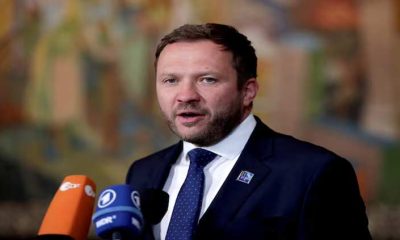World
North Korea’s Kim says he has no desire for talks and repeats a threat to destroy South if provoked
North Korea’s Kim says he has no desire for talks and repeats a threat to destroy South if provoked

World
Estonia summons Russian embassy chief over GPS jamming
Estonia summons Russian embassy chief over GPS jamming
World
Australia boosts funds to Taiwan-ally Tuvalu amid Pacific contest for influence with China
Australia boosts funds to Taiwan-ally Tuvalu amid Pacific contest for influence with China
World
Probe launched after Boeing cargo plane lands in Istanbul without front landing gear
Probe launched after Boeing cargo plane lands in Istanbul without front landing gear
-

 Sports3 months ago
Sports3 months agoSon and Bissouma ready for Spurs game with Brighton
-

 Fashion2 months ago
Fashion2 months agoGiorgio Armani catwalk blooms with florals at Milan Fashion Week
-

 Sports3 months ago
Sports3 months agoSinisterra signs long-term deal with Bournemouth
-

 pakistan3 months ago
pakistan3 months agoECP convenes emergency meeting today
-

 pakistan3 months ago
pakistan3 months agoECP rejects Salman Akram’s plea for PTI affiliation
-

 World2 months ago
World2 months agoTaiwan ally Tuvalu names Feleti Teo as new prime minister
-

 World3 months ago
World3 months agoTunisia court sentences ex-president Marzouki to 8 years in absentia
-

 Sports2 months ago
Sports2 months agoScaled-back opening ceremony for Paris Olympics to offer 326,000 tickets
























